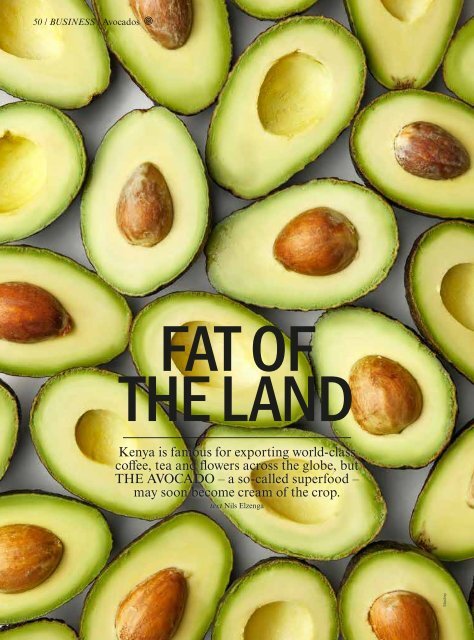Create successful ePaper yourself
Turn your PDF publications into a flip-book with our unique Google optimized e-Paper software.
50 / BUSINESS / Avocados<br />
BUSINESS / 51<br />
FAT OF<br />
THE LAND<br />
IN THE HIGHLANDS just north<br />
of Nairobi, near the industrial town of<br />
Thika, a green revolution is taking place.<br />
A seedlings propagation farm has started<br />
nursing some 100,000 baby trees per<br />
year into adulthood. These trees will all<br />
bear a fruit for which an increasingly<br />
health-aware world is becoming evermore<br />
hungry: the avocado. According to The<br />
New York Times, in 1994 the average<br />
American consumed around 500 g of<br />
avocados per year. Today, that number is<br />
over 3 kg. And typing “#avocado” on<br />
Instagram yields over eight million results.<br />
The soaring worldwide demand for<br />
avocado is perhaps not surprising, considering<br />
that the fruit has proven to be a<br />
nutritional superstar. Two-thirds of it<br />
consists of monounsaturated fats, which<br />
are associated with an improved cholesterol<br />
level, a lower risk of cardiovascular<br />
disease and better insulin and blood<br />
sugar control. Furthermore, avocados<br />
contain some 20 essential nutrients,<br />
including fibres, vitamins C, E, K, B,<br />
folic acid and potassium. Add to that<br />
the fact that the fruit just tastes delicious,<br />
and is considered a great meat<br />
substitute in sandwiches and salads, and<br />
one starts to understand why avocado<br />
has become so popular.<br />
of thousands of farmers across Kenya<br />
have planted avocados,” says Kariuki<br />
Gaita, cofounder and head of exports<br />
for Selina Wamucii, an agriculture firm<br />
that sources and distributes fresh fruit<br />
and vegetables. In total, Gaita estimates,<br />
some 160,000 Kenyan farmers now grow<br />
avocados, making the avocado the<br />
fourth-most-important national fruit<br />
crop behind bananas, mangos and<br />
pineapples.<br />
Smallholder farmers are responsible<br />
for 75 percent of Kenyan production, and<br />
Selina Wamucii currently works with over<br />
3,000 of them. “We expect this number to<br />
quadruple once we open up our farmer<br />
enrolment again,” adds Gaita.<br />
But even with avocado farms mushrooming<br />
throughout Kenya, the sector<br />
can’t keep up with international demand.<br />
Late last year, Kenya’s Directorate of<br />
Horticulture temporarily banned all<br />
avocado exports. “We have stopped the<br />
export of Fuerte and Hass varieties<br />
because traders would ship out immature<br />
crop because of high demand in the<br />
world market,” Agriculture and Food<br />
Authority chief Alfred Busolo told<br />
Business Daily Africa at the time. Luckily,<br />
the export stop was relatively short-lived.<br />
The ban on Fuerte (leathery green skin)<br />
avocados was lifted on 1 February, while<br />
the ban on Hass (bumpy dark green/<br />
purple skin) avocados was lifted a<br />
month later. ><br />
“China imported just 2 tonnes of avocados in<br />
2010, but by last year that figure had risen to<br />
more than 32,000 tonnes”<br />
Alamy<br />
Kenya is famous for exporting world-class<br />
coffee, tea and flowers across the globe, but<br />
THE AVOCADO – a so-called superfood –<br />
may soon become cream of the crop.<br />
text Nils Elzenga<br />
Stocksy<br />
A BED OF ROSES<br />
Soloplant Kenya Ltd, the Kenyan<br />
company behind the avocado seedlings<br />
propagation farm, has been engaged for<br />
over 20 years in a better-known agricultural<br />
success story: roses. Based on this<br />
experience, General Manager Anna<br />
Nosareva predicts a similarly bright<br />
future for Kenyan avocados. “The sector<br />
definitely has a good chance of repeating<br />
the earlier success stories of flowers, tea<br />
and coffee,” she says. Indeed, Soloplant<br />
can barely keep up with the seedlings<br />
demand from the swathe of avocado<br />
plantations that are springing up all over<br />
Kenya. Nosareva is considering scaling<br />
up, considerably.<br />
The amount of land that is dedicated<br />
to growing avocados is increasing every<br />
day. “In the last three years alone, tens<br />
What’s in a name?<br />
Avocados are believed to have originated in the south of what is today Mexico, which is still the<br />
world’s largest avocado producer. Avocados are classified as large berries, and they have been<br />
cultivated since antiquity. Their name derives from the Nahua – the original inhabitants of southern<br />
Mexico – who called the fruit āhuacatl, which also means testicle.

















